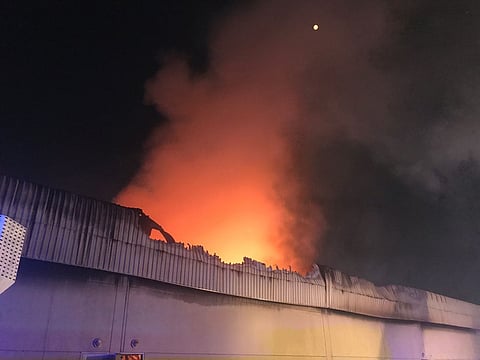Ask the law: Insurance company in UAE refuses to pay damages in factory fire. What now?
A look at the circumstances under which damgaes can be claimed under the UAE law

Also In This Package
Question: I am the owner of a factory in the UAE. A month ago, the factory was exposed to a big fire, which resulted in huge losses. The factory was insured. It was found from the report of a competent authority that the fire was caused by one of the workers. In addition to it, there was a problem with the electrical circuit and the fire alarm was defunct, though periodic maintenance of these devices is done by a specialised company. Currently, the insurance company has refused to pay compensation under the pretext of the violations mentioned in the report. What is my legal position vis-a-vis the insurance company? Does it have the right to refuse to pay compensation on the grounds as stated above?
Answer 1: Federal Law No (5) Of 1985 On the Civil Transactions Law of the UAE under Section III: Provisions Relating to Certain Classes, states:
The insurer is liable for damage resulting from the unintentional fault of the insured or the beneficiary. (Article 1038)
Notwithstanding any agreement to the contrary, an insurer is not liable for damages caused deliberately or fraudulently by the insured or the beneficiary. (Article 1039)
The insurer is liable for damage caused by persons for whose acts the insured is responsible, whatever be the nature of their fault. (Article 1040)
The insurer is liable for the damages resulting from the fire even if the fire broke out owing to a defect in the item insured. Article (1041)
According to the provisions of the above Articles 1038, 1040 and 1041, the insured is responsible for fire damages that occur because of the insured’s fault or the fault of the beneficiary, or that is caused by the insured’s workers, regardless of their mistake. He is also responsible for the damages resulting from the fire, even if this fire resulted from a defect in the insured item, except for the cases mentioned in article 1039 where the insurer is free from responsibility. So if the insurer refuses to compensate, the insured has the right to file a case against the insurer to prove the liability of the insurer.
Dubai Courts decided that “According to the text in Articles 1038, 1039, 1040, and 1041 of the Civil Transactions Law mentioned in the section on fire insurance — and what has been done by this court — that the insured is liable for fire damage that occurs because of the insured’s fault or the beneficiary’s mistake, even if it was a serious mistake. Or what caused by the followers of the insured, regardless of the type of their fault. He is also responsible for the damages resulting from the fire, even if this fire resulted from a defect in the insured thing. But the insured is not responsible for the damages caused deliberately or fraudulently by the insured or the beneficiary or what is intended intentionally by a wilful act of the insured realising the risk of his deeds done by the insured himself or through others. Wilfulness is established if it is proven that the insured colluded with one of his followers to cause the danger. The description of intentional action does not deviate if the insured commits it without his will, which is merely a mistake of whatever degree, which differs from the ensuing fraudulence. Fraudulence is established if the insured uses fraudulent methods to deceive the insurer with the intention of realising the insured risk intentionally.
It is also decided that proof to establish intentional damage or fraudulence on the part of the insured is a burden that falls on the insurer.
Extracting evidence of an act of premeditation or committing fraud on the part of the insured or denying it is one of the factual matters that the trial court is independent to understand and assess the evidence and documents submitted to it. (Appeal No 2007/148 Civil Appeal).
Severance pay cheque dishonoured
Question 2: I had worked in a company for two years. One month ago, my company terminated me. The company agreed to provide me with all my labour dues. They paid me through a post-dated cheque, which was to be presented for encashment in two weeks’ time. Therefore, I signed before the Ministry of Labour confirming that I had received all my labour dues. The cancellation of my employment was also done in due course. However, the cheque given to me as the payment for my end-of-service benefits was returned by the bank and the company’s bank account was closed. The company finally paid me only 20 per cent of the cheque amount. As per UAE law, do I have the right to approach Ministry of Labour to claim my labour dues and to inform them that the said cheque was returned without payment? Please advise.
Answer 2: I would like to clarify to the questioner that, he may not file a new case with Ministry of Labour once again to claim the cheque value, given the fact that the questioner had signed before the Ministry of Labour that he had received his rights in full from the employer. Therefore, in this case, he has no choice but to file a criminal complaint against the cheque issuer, as well as file a civil case against the company.
Sign up for the Daily Briefing
Get the latest news and updates straight to your inbox









